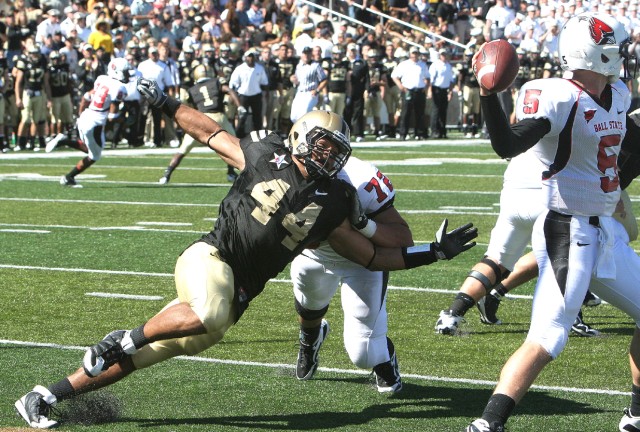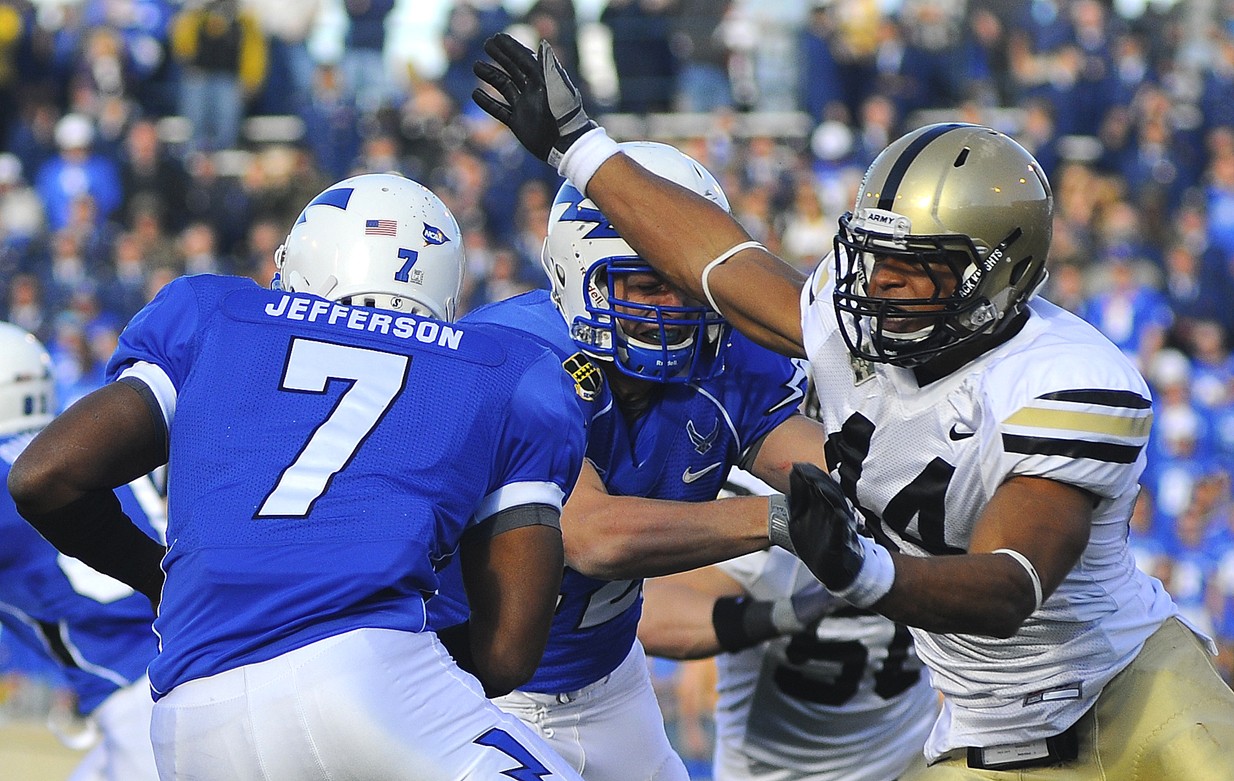Being undersized can be a detriment in athletics, especially in football where size can rule the gridiron. However, as a 6-foot-1-inch, 225-pound defensive end, Junior Josh McNary hasn't let his lack of size against bigger, more powerful offensive linemen keep him from his goal-sacking the quarterback.
McNary enters the Army-Navy Game in Philadelphia Saturday third in the NCAA with 12.5 sacks while adding 22.5 tackles for a loss, both totals lead Army defenders by a wide margin in 2009.
The undersized lineman has made up for his shortcomings with his heart and tremendous speed off the corner. However, add the biggest wrinkle-the change to the double-eagle flex defensive scheme -and McNary benefited to become Army's all-time leading career and season sack leader.
"Josh is a guy who is specially gifted," Army head coach Rich Ellerson said. "He plays a role in our defense that frankly requires him to be productive. We give him some latitude and allow him to play a little bit further on the edge than some other guys around him because he does have that playmaking ability.
"If we can get him matched up with people in space," Ellerson added, "he's going to win his share of battles and finish plays."
From his days of coaching at Arizona and Cal Poly as a defensive assistant coach and head coach, respectively, Ellerson employed the double-eagle flex and the player who performed at the "quick" position tended to benefit greatly from the blitz-oriented defense.
The "quick" role at Cal Poly led Chris Gocong to 42 career NCAA sacks and, currently, a three-year NFL career with the Philadelphia Eagles.
Back in the early 1990s, while Ellerson was at Arizona, a young defensive lineman named Tedy Bruschi took advantage of the pressure-style defense to get an NCAA-record 52 sacks before a 13-year NFL career with the New England Patriots.
McNary now can think of himself with the likes of Gocong and Bruschi because his head coach strongly feels he belongs with them.
"Those guys belong in the same sentence as they carried the same responsibility and did it rather successfully," Ellerson said. "(McNary's) absolutely the right guy for this role. He plays the role that needs to be played (in this defense) and because of his success, it makes us collectively successful."
While McNary has been a success every step of the way from being a standout defensive lineman in high school in Houston to 11 sacks in 2006 at the U.S. Military Academy Preparatory School, it hasn't been exactly handed to him especially considering he was a "walk-on" at the prep school.
"I had offers from Division II schools, but I really wasn't interested in playing football at a Division II school," McNary explained. "To me, it was playing at the big level, Division I, with thousands of people watching or not playing at all and focusing on my academics.
"Prior to getting accepted at West Point, I was going to go to the University of Houston to focus on school and try to become a pharmacist," he added. "I feel blessed that I was able to get an opportunity to play here."
Getting the Army sack record means a lot to McNary because he gets to leave his own legacy at the academy while passing his mentor, defensive tackles coach Clarence Holmes, on the Army single season sack-record list. The record also shows that size isn't the only way to determine the strength, determination and greatness of a player.
"It's rewarding to see my work pay off in this way and get in the record books," McNary said. "From countless hours in the weight room to running on the field to improving my speed, quickness and technique, all that work paid off and it's a glorious feeling."
The opportunity to be remembered in the same way as Glenn Davis, Doc Blanchard and Pete Dawkins is what inspires McNary and it drives him forward every day, but he also understands to be remembered like those immortal Army players there has to be many wins involved.
"In order to be remembered you have to do more than just perform on an individual level, it's a team effort," McNary said. "You can have all the sacks in the world or lead the nation in sacks, but if your team doesn't win it really doesn't mean anything."
Timing has been a big part of McNary's collegiate career. Injuries gave him more playing time his plebe year and then an injury along the defensive line allowed him to move from linebacker to an end position his sophomore year. His first play from scrimmage last season as a defensive end resulted in a sack against Texas A&M.
He had the best individual game of his career this year when he made four sacks against Temple; however, he felt that the Vanderbilt game was more rewarding because of the team's victory.
"My numbers didn't speak too loudly (the Vanderbilt) game, although I did have one sack and felt great to do it against an (Southeastern Conference) team," McNary said. "However, the fact we were able to pull off the victory and upset them made that performance a lot more special ... it is definitely the best team moment of my career, but, hopefully, that will change in the future when we beat one of our rivals, Navy or Air Force. I'm thankful for the opportunity upcoming (against Navy), so stay tuned."
McNary sees Navy as a formidable opponent and has been impressed by their play throughout the season, particularly the close loss to Ohio State in September.
"It gave me a good impression on the way Navy competes," McNary said. "We will have to step our game up, play sound and play at our highest level. We can't afford to make many mistakes against a team like Navy, who is very disciplined and tough."
Being a part of the Army-Navy rivalry is special to McNary considering all the greats on both sides who've played in the game for more than 100 years. However, McNary sees the game as more than its history and splendor, but a coming together of brothers.
"It represents two branches (of service) and brothers in arms, but on this day we're intense rivals of each other and we represent our Army when we play this game," McNary said. "What makes it so special is the fact we represent a group of people who choose to lay down their lives to serve our country, at least that is what makes it special to me."
Beating Navy and earning a bowl bid Saturday would be amazing to McNary, something that words can't quite describe. He's committed to those goals and the commitment to playing his best every game, a commitment that has allowed the versatile, quick defensive lineman to beat the odds and become one of the best pass rushers in college football.
"It speaks a lot about him ... with recruiting, I know a lot of people who would have passed on him because of his stature," Ellerson said. "It seems to be a common thread with extraordinary guys over the years whether they are mike linebackers, rush ends or free safeties, guys who have been overlooked and underappreciated through their (high school) careers, but then evolved into spectacular players (in college).
"I'm not sure why that is (that certain guys get overlooked), but it goes back to the recruiting and evaluation process, which does not overlook stature," he added. "(Army) looked for that other spark (smaller players have), and (McNary) clearly has it."




Social Sharing